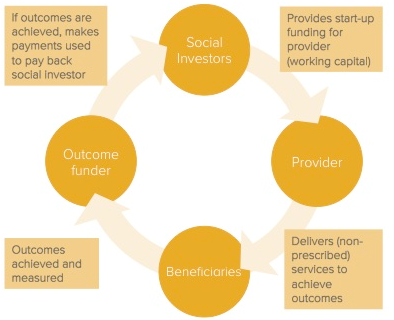There is a growing debate about social investment and the role it could play in tackling multiple needs. MEAM has invited a series of guest blogs on this topic, starting with Caroline Hickson, an Investment Associate at social investment intermediary Numbers for Good.
Public services in the UK are generally set up to support people with single, severe problems, and typically contracted on a “fee-for-service” basis. It’s a difficult challenge to move away from this, but one where the nascent sector of Social Impact Bonds (SIBs) could help.
What is a social impact bond?
SIBs are a new way of delivering public services. They are, in essence, a contract between service providers, outcome funders and social investors, usually structured by an intermediary such as Numbers for Good.
 At the outset of a SIB, the outcome funders (normally commissioners) decide on the key outcomes they want to achieve – for example, reducing the number of rough sleepers. The chosen third-party provider (usually a charity or social enterprise) delivers a service aimed at achieving these outcomes.
At the outset of a SIB, the outcome funders (normally commissioners) decide on the key outcomes they want to achieve – for example, reducing the number of rough sleepers. The chosen third-party provider (usually a charity or social enterprise) delivers a service aimed at achieving these outcomes.
The social investor provides the initial funding to the service provider, and also takes on the risk of the service not achieving its outcomes. If the service is successful and outcomes are achieved, the outcome funder makes payments that are used to pay back the investor.
This avoids the provider facing an initial cash deficit (called a working capital shortfall), where it incurs costs but has not yet been paid. For a charity or social enterprise, this is a risky position to be in. If the intervention does not work (i.e. it does not achieve the expected outcomes), no outcomes payments are made and the loss is borne by the social investor.
Simple, right? Admittedly, it’s a little more intricate than traditional “fee-for-service” commissioning but the emphasis on outcomes can help both providers and commissioners to focus on what they want to achieve. A SIB approach for those with multiple needs could be beneficial in several ways.
Where could Social Impact Bonds help?
Firstly, a SIB approach encourages innovation. The provider – who usually is the most knowledgeable about the beneficiary group – is free to adapt its service as it sees fit to achieve the outcomes. The transfer of the financial risk to the investor should mean the commissioner is also willing to support new types of services, as they do not pay if outcomes are not met.
Secondly, it encourages a longer-term and more holistic view of public services. People with multiple needs often do not have one severe problem, but several ‘low-level’ issues that are likely to get worse over time without help. A social investor is able to support early intervention as it has the capital to spend that a commissioner may not, and typically has longer time horizons.
Finally, because measuring and assessing outcomes is a key component of the SIB (otherwise the outcome funder will not pay), an outcome-based or SIB approach should improve the service provider’s measurement of impact. This ‘impact audit’ process for providers enables them to improve their service and ensure they are really achieving the outcomes they want.
Is it the right approach?
The process of structuring a SIB is more involved than that of a ‘fee-for-services’ contract, but feedback from SIB participants has been that the discipline involved in doing this has ultimately been beneficial.
Of course, as with any commissioning strategy, whether a SIB approach is better for beneficiaries will depend on the time, care and attention taken to ensure the outcomes are well-defined, effective and avoid any perverse incentives. And, of course, in some cases, a payment-by-results or outcome-based approach may not be appropriate.
For those interested in whether a SIB could deliver better outcomes, the recently launched £80m Life Chances Fund and Cabinet Office-backed Government Outcomes Lab provides funding and support for setting up and managing SIBs. Intermediaries such as Numbers for Good also work with all stakeholders on the feasibility and execution and management of social impact bonds.
Creating a SIB involves a shift in all of our thinking about the way we deliver public services – but the benefits to providers, commissioners and, most importantly, beneficiaries can be significant.
The Life Chances Fund will issue themed invitations for SIBs across six themes. Expressions of interest for the first two themes, children’s services and drug and alcohol dependency, are due by 30 September 2016. Further themes will be young people, early years, healthy lives and older people’s services.
From their offices in Newcastle and London, Numbers for Good create financial solutions that allow organisations to fund social and environmental projects. Get in touch with them at info@numbersforgood.com.
